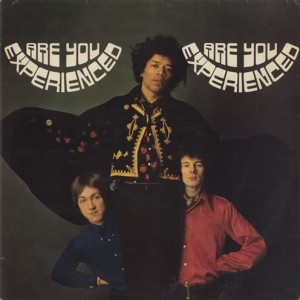

 Jimi Hendrix
Jimi Hendrix
| Release date | Label | Producer | Genre | Length | More info |
| 1967.05.12 | Track / Reprise | Chas Chandler | Psychedelic Rock | 40:12 |  
 |
Great question, but don't rush to give a positive answer - winners get free passes to the 27 Club.
Background
Everybody knows this: in late 1966, a black American guy called Jimi Hendrix appeared, from out of the middle of nowhere, right in the middle of London, took the world by storm, and music was never the same afterwards. Everybody must have heard or read about at least one or two testimonies from people like Eric Clapton or Pete Townshend about how they were taken completely by surprise, swept off their feet, had to rethink their entire musical strategy in the wake of The Bomb. Others have, however, attempted to approach the legend more soberly, strip it of its pure sensationalism, remind people how, after all, Jimi Hendrix did not really "invent" distorted guitar rock, or psychedelic music, or was far from the first person to experiment with feedback, special effects, and unusual chords in a recording studio. But that, in turn, makes the legend more difficult to grasp, because if the guy was not the "first", then what was he? How do you go about properly explaining the unique genius of Hendrix without getting bogged down in technicalities, but at the same time without sacrificing the complex truth?
I do believe, for one thing, that it makes perfect sense to speak of Jimi from a "racial" (or, in reality, "subcultural") standpoint. Arguably the main reason why Hendrix found it so hard to break through in America, and had to be "imported" to England in order to enter the music business as an independent artist, was because, in the States, he did not fit into convenient "racial stereotypes". In 1964-65, the Afro-American guy who made it big belonged to one of the two types - (a) The Soul Singer (like Sam Cooke or Ben E. King) and (b) The Blues Guitar Player (like B. B. King or any other of the extended King family). (A third type was, of course, The Jazz Instrumentalist, but that is a little beyond our current necessary scope). These were roles that were accepted by both the black and the white communities; everything outside of them would be looked at with suspicion by both of them - remember, for instance, how Jimi, when playing guitar in Little Richard's band, was constantly put down by the boss, which was in part personal jealousy, of course, but also, I believe, partly due to discontent at the sight of a musician clearly wishing to overstep his permitted boundaries. Too bad, because what Hendrix was really trying to do, already at that early period, and probably without knowing it, was to "reclaim" rock'n'roll from the white man - that strange new form of music that grew out of Muddy Waters, Howlin' Wolf, Little Richard, and Chuck Berry, yet somehow ended up appropriated by a completely different culture and ethics. As cool as black music was in the era of British Invasion, with Atlantic, Motown, and the blues greats rippin' it up at every corner, there was no reason whatsoever why black musicians could not do (more or less) the same thing, evolve (more or less) in the same direction as the whiteboy bands - The Yardbirds, The Who, even The Beatles. One thing and one thing only was needed for that: an unshackled, initiative-oriented, talented mind, one that could work without significant commercial/formulaic restrictions - in the mid-Sixties, still imposed by the business on pretty much any popular Afro-American musician.
So when Chas Chandler whisked Jimi away to England in September '66, giving him complete creative freedom in the studio, that must have been, like, one of the greatest hand-lendings from white man to black man in the history of Afro-American art. Prior to that, due to tense racial relations, the black performer in the States, more often than not, felt him- or herself bound by a certain unwritten "code of personal politeness" (as is well illustrated, for instance, by the obligatory suits and ties that black performers wore even long after the white folks had switched to much more casual clothing on stage). Be impolite, and you just might get it. Hendrix, temporarily extracted out of that "artistic dungeon", did pretty much the same for black music that the early Delta people did at the dawn of the record-making era - he brought back the unrestrained passion, heavily sexualized, wildly aggressive, bursting with so much energy as if everything that Afro-American music accumulated and restrained over the past thirty years got discharged in one moment. In other words, it was as if he'd taken all those advances of British Invasion groups and re-populated them with the spirits of people like Blind Willie Johnson and Charley Patton in an instant. It was not merely a set of technical advances that he demonstrated to the awestruck Clapton and Townshend that fall in London - it was the idea of complete, unrestricted spiritual freedom in music, an idea that almost paradoxically (but, when you stop to think about it, also somewhat logically) came from a representative of a still oppressed minority.
Of course, it did not hurt to show prowess and technique, either, but in this context, prowess and technique are hardly separable from spiritual freedom: people like Pete Townshend and Syd Barrett were also "wild" on stage and experimented with feedback and stuff, yet next to Jimi, their styles could look reserved and almost too flashy-manneristic in comparison. Here was, almost literally, this wild beast from the Afro-American inferno, yet one who'd also managed to channel all that dark sexual energy into a generally positive, uplifting, psychedelic riverbed - unlike The Who, The Jimi Hendrix Experience was never an "angry" band, despite being so much louder and wilder. In short, Jimi Hendrix was the first musician in rock music who both strived for absolute freedom and was, I'd say, objectively qualified for that freedom: a rare combination that could probably, at that time, only have been achieved by means of a black guy from America exported to British soil. At the very least, I don't think all of those details of Jimi's descent and biography are coincidental relative to his success - that'd be just way too much of a coincidence.
Some basic factsIt might be important to note that, despite all that creative freedom I'd mentioned, Jimi was a thoroughly disciplined perfectionist, and none of his albums was ever recorded in a hasty week-long session. The perfectionism, as well as a clever PR campaign and a skilful increase of public interest through a series of single releases, paid off well: the album charted higher in the UK than anything he'd do later (in the US, predictably, it didn't climb so high, but still reached a respectable No. 6), and as for critical recognition - well, it's not up to me to remind you. Suffice it to say, unlike so many other critical masterpieces, Are You Experienced has never suffered from a backlash - it's that kind of record which you can like or dislike, but whose "rule-changing" impact on the entire world of popular music could only be denied by the same people who also deny the Holocaust, continental drift, and female orgasm. (With all three of which, incidentally, Are You Experienced shares a little something in common.)
For the
defense
If you think I'm exaggerating a little, focusing so much on Jimi's Afro-American roots, just throw on ʻFoxy Ladyʼ for a change and think: "Could any single white rocker at the time have a song like that?" And it's not as if white rockers hadn't already written plenty of their own sexual anthems, but this stuff, in the spirit of the times, is just plain musical pornography. That opening ringing vibrato is your foreplay (more precisely, the musical equivalent of the guy shaking his ding-dong), and then, of course, with the famous Hendrix chord comes THE THRUST OF THRUSTS, the likes of which nobody'd ever experienced before. Thrust - thrust - thrust - regroup - thrust again; I wonder how many prudes, upon hearing this riff, would run for cover in the still relatively innocent days of 1967. Not since the heyday of Howlin' Wolf had there ever been such an aggressive expression of raw sexuality, still largely tabooed in white society, except now the chief instrument for this expression was an electric guitar, rather than the human voice (Jimi's vocals on the track are pretty aggressive as well, but, as he himself would readily acknowledge, he was always a player first and a singer second). There is one significant difference, though: Jimi's "aggressive sexuality" was always completely free from any "evil" connotations. (With the possible exception of ʻVoodoo Chileʼ, which would only come later, and even then the focus was on "supernatural", "titanic", rather than "demonic", "devilish"). The precise message of the song is pretty simple, come to think of it, - "wanna fuck?", and since the answer is almost predetermined, the rest of the song, including the orgasmic (sorry) solo, is all about the physical pleasure of copulation. Suddenly, you know, there's just no stigma attached to it. None of that old-school Christian "sex is evil" mentality. No, simply one of the greatest guitar tributes to the wonder of sex in the history of mankind. (And the second greatest is arguably ʻFireʼ - just a few blocks down the street).
That said, it would be a disservice to Are You Experienced to say that it all revolves around sex and nothing but sex. Jimi's artistic vision was fairly holistic: he was an idealist, dedicated to a search for absolute abstract beauty, which he was able to capture in his guitar sound, and beauty to him, I think, was a complex and indivisible unity of all sensual and intellectual pleasures - thus, the sound of the album is really quite monolithic, while at the same time trying to symbolically represent the awesomeness of sexual passion, drug haze, natural beauty, and, uh, "cosmic flow". That final question - "are you experienced?" - is never really completed, because we never get to be asked in what precisely we have to be experienced. Sex? Drugs? Music? Knowledge of the world? We do get a hint, though, in the form of the line "not necessarily stoned, but beautiful" - see, that's the key: 'beautiful' is the very last word spoken on the album. The songs in general vacillate between questing for beauty, with their interrogative or negative titles (ʻCan You See Me?ʼ, ʻI Don't Live Todayʼ etc.), and locating beauty (ʻMay This Be Loveʼ, ʻThird Stone From The Sunʼ), but beauty is a complex thing, and while it does include that sexual component as a total necessity, it is still only one of the components.
It is important to remember, of course, how much Jimi was influenced by his short, but fruitful sojourn in Greenwich Village, and all that influence that Dylan and beat poetry had on him: all that vision required something beyond Howlin' Wolf and Little Richard to be triggered, and so it is fun to compare, for instance, his early cover of ʻKilling Floorʼ (not included on this album, but still performed at Monterey and other venues) and something like ʻCan You See Me?ʼ - a song that takes its cues from the same electric blues pattern, but adds distinct psychedelic elements both in the lyrics ("if you can see me doing that you can see in the future of a thousand years" - compare The Who's ʻI Can See For Milesʼ, etc.) and in the music: that twangy "ping!" that introduces each new verse like an imaginary light bulb coming on was certainly not lifted by Jimi from Hubert Sumlin. Or ʻThird Stone From The Sunʼ, a silent poetic masterpiece of "astral psychedelia" that borrowed some elements from traditional jazz guitar playing but would, in itself, pre-date rather than post-date all those cosmic psycho-jazz offerings from Pharoah Sanders and the like - God only knows where that one came from. Again, though, compare it with Pink Floyd's ʻAstronomy Domineʼ, created around the same time - Syd and Co. are clearly afraid of the cosmos ("stars can frighten", etc.), whereas Hendrix's composition is written from (rather than opposed to) an alien perspective. It's like, you know, about this totally peaceful mission that discovers the Earth and circles around the planet for a few minutes, admiring its coolness. So what if there are some hystrionic solos, and if the song ends in a mess of screechy, dissonant feedback? It's just minor equipment malfunctions. It's all cool, man. Stars can't frighten - we've been to all of 'em and they're all totally cool.
On the other hand, perhaps dwelling too much on Hendrix's "musical philosophy" means putting the cart before the horse: it is more likely that the motivation was not "I want to express this and that, so I'll point my guitar in that direction", but rather "hey, I can get this cool sound out of my guitar, I guess I'll use it to express this particular idea". Because, ultimately, Are You Experienced is not a concept album (although the next two Experience albums already sported some conceptual flavor): it is a bunch of fairly diverse tunes, ranging from fairly stereotypical (if still obligatorily Hendricized) 12-bar blues like ʻRed Houseʼ to sexual anthems like ʻFireʼ to chivalrous ballads like ʻMay This Be Loveʼ. In the end, it just came together this way, but the genius of Hendrix is in that he was able not merely to produce all these strange new sounds, but to stuff them with real meaning. The painful, skull-bursting guitar wails on ʻManic Depressionʼ really sound like psychotic attacks; the guitar tone on ʻMay This Be Loveʼ really does symbolize the utmost in tenderness (I could swear it has some of the exact same overtones that Paul McCartney's voice has on ʻHere, There And Everywhereʼ!); and although the idea that the opening chords to ʻFireʼ really sound like a firethrower blast comes into my head secondarily, who knows what sort of associations they caused in Jimi's head? Nothing here is weirdness for weirdness' sake - Hendrix is painting pictures with his guitar, sometimes of the natural and sometimes of the supernatural, but all of them very easily open to emotional interpretation.
It is all nicely wrapped up, then, in the title track, which could be thematically described as a combination of ʻTomorrow Never Knowsʼ (which predated the album and with which Jimi was obviously familiar) with ʻMagical Mystery Tourʼ (which came after the album and may have, in turn, be remotely influenced by it) - the droning rhythmics and backward tapes echo the delirious otherworldliness of the former, whereas the lyrics, inciting the listener to let go of "your little world", take Jimi's hand and go "watch the sunrise from the bottom of the sea", are one of those open invitations to "take a trip", albeit on a somewhat more personal level. This here is an individual offer, not a group tour: in fact, Jimi had always been too shy to go for one of those proto-arena-rock anthems (he'd only let loose a bit in his Band of Gypsies stage, but it didn't sound too natural anyway), preferring instead to engage the listener on an intimate basis. Strangely enough, the track finishes the album rather than begins it - you'd probably expect that an invitation to a supernatural trip should be a hello rather than a goodbye; but then, who knows? maybe the preceding ten tracks were intended as a "preview" of sorts, and then it would only be on the very last track that the protagonist is finally turning his face to the audience and breaking through the fourth wall: "there, I've just shown you all this magic, and now you can take my hand and join me in this brave new world". Besides, it'd sure act as a great stimulant to buy his next album!
For the prosecution
Early on in life, I used to think of Jimi as a poor songwriter - great player, for sure, decent singer, and cool personality all the way round, but not that much of a hookmaster. I still cling on to certain shards and dregs of that impression, but I think I know now what really used to throw me off: it's not so much Jimi's inability to find a proper hook (in fact, almost every song on Are You Experienced has at least one) as his unwillingness to cling on to it. It's not even so much a precise jazz influence on the man, but rather just a subconscious aversion to becoming firmly rooted and attached to one specific groove in one specific, never-alternating form. Fact is, Jimi would never record anything like The Who's ʻThe Seekerʼ, or anything that would even remotely approach Black Sabbath or AC/DC: playing the same riff twice with exactly the same notes and chords seemed like a bore for him, and no sooner would he establish some sort of hook that he'd be already shaking himself free of it and flying away in some other direction. And I am not saying that one approach is inherently better or worse than the other, because freedom can be overrated sometimes, and not all of Jimi's on-the-cuff flights of fantasy were equally inspired or memorable. For instance, a track like ʻLove Or Confusionʼ does very little for me in the verse section, where both the vocal and the instrumental melody just sound too unstructured - it is only when he gets to the final "is it love baby or is it just-uh... confusion?", accompanied by the twice-repeated descending guitar riff that it properly clicks. On the other hand, everything is still assessed in comparison - a prolonged period of exposure to contemporary jazz recordings, for instance, will quickly make you re-evaluate those Hendrix songs as the epitome of pop tightness and fully rational approach to improvisation...
Speaking of individual songs, I am still not a fan of ʻRememberʼ, which, if I recall correctly, was one of Jimi's earliest attempts at songwriting and is a genuinely hookless piece of R&B, only redeemable by its strong beat, but not really representing the man at his songwriting or playing best. And, while we're at it, at least one of the appended singles, ʻThe Wind Cries Maryʼ, makes Jimi way too much of a starry-eyed Dylan fanboy - I mean, being influenced is one thing, but this is totally like "Jimi trying to write an authentic Dylan song" (and he'd make at least one more attempt at it on his next album, with ʻCastles Made Of Sandʼ), and while the song has plenty of nice touches, like the "wind caress" of the gently stroked guitar in the chorus, it's always been hard for me to take the tune seriously, simply because it's still Jimi trying to be somebody else rather than himself. But yes, I guess that these quibbles are sort of inevitable - no matter how brilliant your first album is, since it is your first album, at least some of those "formative" elements will be creeping in through the cracks, kind of inevitably.
Conclusion
| Melody | Voice | Mood | Production | Innovation/Influence | Where it belongs | RYM preference | |
 |
 |
 |
 |
 |
 |
#33 (Aug 14, 2016) |

| Previous entry | Main page | Next entry |